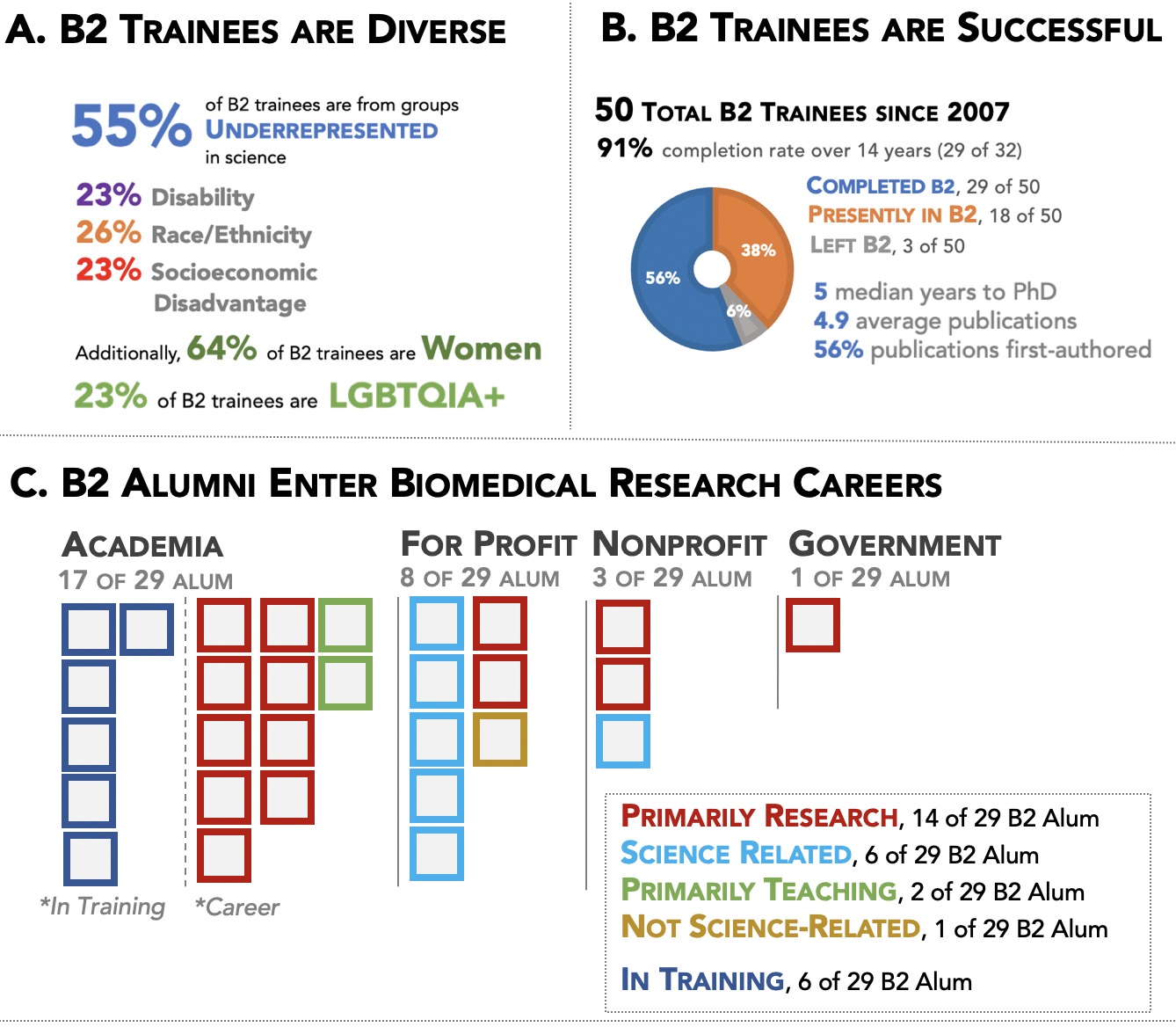B2 Alumni
Fifty predoctoral trainees have undertaken the B2 Program since 2007.
To date, 29 of these trainees have completed their PhD, 18 remain in training, and 3 from our first cycle of funding exited without a PhD.
Our trainees are a diverse group, with 55% coming from one or more underrepresented groups (26% underrepresented minority, 23% ability disadvantage, 23% economic disadvantage); 64% have been female and 23% LGBTQIA+.
For comparison, nationwide 20% of predoctoral students in the behavioral and social sciences are from a U.S. underrepresented minority and 72% are female (NIH, 2021a). Consistent with our historical focus, 80% (40/50) of our trainees are from one of our two affiliated psychology PhD programs.

Our metrics provide evidence of our program quality: the program boasts a 91% retention rate (29/32), a median time-to-PhD of 5 years, and our trainees have averaged 4.9 publications from their course of graduate study (56% as first-author; excluding new entrants, three early exits). In line with the mission of the B2 Program, 69% of our alumni have published predoctoral work involving a neuroscience method, and 52% have multiple co-authors who were B2 Program faculty at the time of their training; combining these metrics, 41% have a neuroscience publication with multiple B2 Program faculty.
Turning to the early career outcomes for the remaining alumni, 11 (48%) are in the academic employment sector (all with faculty appointments) (Figure 1c, Academia); 14 (61%) have a primarily research position (Figure 1c, red squares); intersecting tiers, 9 (39%) are in the academic sector, with research faculty appointments (with 7 (30%) at an R1 institution).
Amongst our 17 recent alumni, 4 (23.5%) have garnered F32/T32 postdoctoral fellowships. Amongst our 12 advanced alumni, 2 (17%) hold a K-award and 1 (8%) holds multiple NIH research program grants (RPGs). Together, our alumni hold NIH awards that span across 7 institutes, with each award involving neuroscience methods.
Collectively, our outcome measures demonstrate that we have been successful in our primary aim to prepare trainees for neurobehavioral research careers with health relevance. For nearly all measures, our trainee performance indicators exceed NIH benchmarks. This is especially impressive, as outcomes for predoctoral students with NRSA support are typically better than for individuals from the same institutions without NRSA support (NIH 2001, 2012a,b). Thus, B2 trainees are outperforming the typical career enhancement associated with NRSA support.
In addition to meeting its primary mission, the B2 Program has met its secondary aims, which are to equip trainees with skills for success in the broader scientific workforce and to increase the diversity of the scientific pipeline. An impressive 97% of our alumni (28/29) are in continued training, remain in research, or have progressed into teaching, clinical, or science-related careers that utilize their B2 training. These include highly desirable government and private sector positions as data scientists, research directors, and C-suite officers in the neurobehavioral technology sector. Further, 75% of our alumni (3 of 4) from an underrepresented racial/ethnic minority hold faculty positions (1 primarily teaching, 2 primarily research) and are already playing vital roles in the mentorship of undergraduate and graduate students from underrepresented groups.
This is apparent in B2 Alum comments about the B2 Program, such as: “The B2 grant was foundational to the direction and trajectory of my career. I honestly don't think I would be where I am now in my career without it.